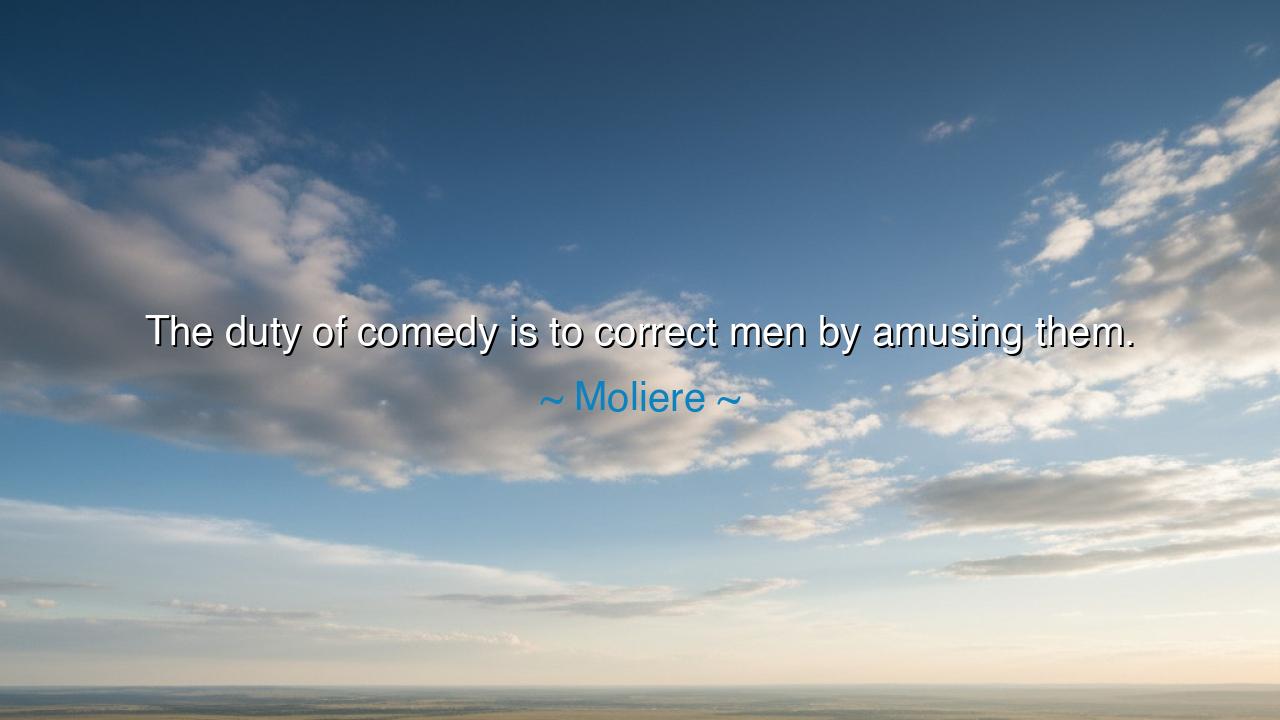
The duty of comedy is to correct men by amusing them.






The wise dramatist Molière, master of laughter and mirror of mankind, once declared: “The duty of comedy is to correct men by amusing them.” Within this simple yet profound truth lies the very soul of art — that comedy, when born of insight and compassion, becomes not a weapon to wound, but a lamp to reveal. It shines upon human folly not to condemn it, but to awaken it. Molière understood that the laughter of men, when guided by wisdom, is more powerful than the anger of kings or the sermons of priests. For through amusement, truth can slip gently into the heart, where rebuke alone would never be allowed.
Molière, born in seventeenth-century France, lived in a world bound by pride, hypocrisy, and moral pretense. He saw that men often resisted correction when confronted by scorn but yielded when touched by humor. In plays like Tartuffe, The Misanthrope, and The Imaginary Invalid, he used laughter as a subtle blade — polished with wit, tempered with reason, and wielded with grace. When he mocked the pious fraud of Tartuffe, he did not shout against corruption; he invited the audience to laugh at it. And in that laughter, the audience recognized themselves. Thus, comedy became his sermon, his mirror, his moral school.
The ancients, too, believed in the healing force of laughter. Aristophanes, in the days of Athens, used comedy to expose greed and political folly. His plays spared no one — the powerful, the foolish, the hypocritical — yet his purpose was not destruction but renewal. Like Molière centuries later, he understood that laughter purifies. It disarms the proud, humbles the vain, and teaches wisdom through joy. Where tragedy instructs by sorrow, comedy instructs by delight. The one warns us of what we may become; the other reminds us of what we already are.
Molière’s insight reaches beyond the stage and into the very heart of human nature. To correct others by anger breeds resistance, but to correct through laughter invites reflection. A man scolded will defend himself, but a man amused will think. This is the alchemy of comedy — it turns judgment into understanding. It allows the teacher to speak truth without cruelty, and the listener to learn without shame. Thus, laughter becomes a bridge between truth and tolerance, between wisdom and humility. It heals the soul while enlightening the mind.
There is a story told of Abraham Lincoln, who, in the midst of war and sorrow, used humor to soothe both allies and enemies. Once, when criticized for telling jokes during such grave times, he replied, “If I did not laugh, I should die.” Yet his laughter was not frivolous. It was a tool of clarity — a way to reveal hypocrisy, relieve tension, and speak truth to power without bitterness. Like Molière, Lincoln knew that humor, when guided by conscience, can mend hearts where argument would only divide. Both men understood that moral correction must be wrapped in humanity, not hostility.
In every age, the world needs such comedy — not the cruel laughter that mocks, but the wise laughter that mends. True humor is not born from superiority but from sympathy; it recognizes our shared imperfection and gently calls us to rise above it. Molière’s vision was not of jesters entertaining for coin, but of artists serving the moral health of society. He believed laughter could do what laws could not: reform the soul through joy. This is the sacred duty of comedy — to teach without preaching, to awaken without condemning, to heal through mirth.
So, my listener, take this lesson as both guidance and challenge: when you see folly in others, do not rush to scorn — learn to amuse and enlighten instead. Use laughter as light, not as fire. Let your humor be gentle but true, your wit sharp but kind. For laughter that flows from love has the power to change men’s hearts. As Molière knew, the noblest art is not the one that entertains the mind, but the one that transforms the soul — and there is no truer path to transformation than a smile born of understanding.






AAdministratorAdministrator
Welcome, honored guests. Please leave a comment, we will respond soon